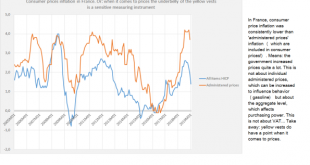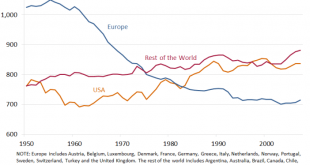Support the stream: https://streamlabs.com/deanbaker1
Read More »Farhad Manjoo promotes billionaire ideology in proposal to get rid of billionaires
from Dean Baker New York Times columnist Farhad Manjoo tells us that he likes to “explore maximalist policy visions” in his columns. He falls well short of this goal in a piece calling for abolishing billionaires, which actually helps legitimate their existence. The piece repeatedly tells us that their wealth is driven by technology, a point that first appears in the subhead which refers to “tech-driven inequality.” The problem with Manjoo’s piece is that the inequality is not in fact...
Read More »Let them pump biodiesel… Or: the French yellow vests are right about prices.
There is a lot of ado about the French yellow vests who, somewhat violently and in a tenacious way protest the french government and battle the french police. The protests erupted when the Macron government increased gasoline and diesel prices. Was this the proverbial drop which made the bucket overflow (”la goutte d’eau qui fait deborder la vase” or, to comply with Anglosaxon culture and to connect with the new nationalism in Anglosaxonia (not to be confused with Niedersachsen)): “the...
Read More »Socialism and exploitation
from David Ruccio If you listened to or read the text of President Trump’s State of the Union speech Tuesday night, you might have been surprised by the explicit mention of socialism. Here, in the United States, we are alarmed by new calls to adopt socialism in our country. America was founded on liberty and independence — not government coercion, domination, and control. We are born free, and we will stay free. Or maybe not—since just last year the Council of Economic Advisers apparently...
Read More »Fallacies of financial fundamentalism
from Lars Syll Fallacy 2Urging or providing incentives for individuals to try to save more is said to stimulate investment and economic growth. Again, actually the exact reverse is true. In a money economy, for most individuals a decision to try to save more means a decision to spend less; less spending by a saver means less income and less saving for the vendors and producers, and aggregate saving is not increased, but diminished as vendors in turn reduce their purchases, national income...
Read More »Yearly hours worked per capita in USA, Europe and rest of the world
Progressive taxes only go so far. Pre-tax income is the problem
from Dean Baker In recent weeks, there have been several bold calls for large increases in progressive taxation. First we had Representative Alexandria Ocasio-Cortez (D-NY), often referred to as AOC, proposing a top marginal tax rate on income over $10 million. This sent right-wing talking heads into a frenzy, leading many to show they don’t know the difference between a marginal tax rate and an average tax rate. (AOC’s 70 percent rate would only apply to an individual’s income above $10...
Read More »Dean Baker Live Stream
Support the stream: https://streamlabs.com/deanbaker1
Read More » Real-World Economics Review
Real-World Economics Review





